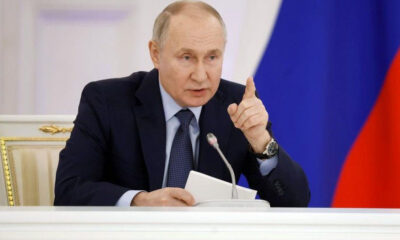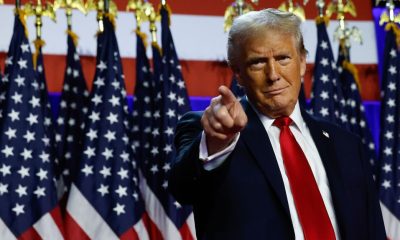International
Putin to send ‘doomsday’ warning to West at Russia’s WW2 victory parade

President Vladimir Putin will send a “doomsday” warning to the West when he leads celebrations on Monday marking the 77th anniversary of the Soviet Union’s victory over Nazi Germany, brandishing Russia’s vast firepower while its forces fight on in Ukraine.
Defiant in the face of deep Western isolation since he ordered the invasion of Russia’s neighbour, Putin will speak on Red Square before a parade of troops, tanks, rockets and intercontinental ballistic missiles.
A fly-past over St Basil’s Cathedral will include supersonic fighters, Tu-160 strategic bombers and, for the first time since 2010, the Il-80 “doomsday” command plane, which would carry Russia’s top brass in the event of a nuclear war, the Defence Ministry said.
In that scenario, the Il-80 is designed to become the roaming command centre for the Russian president. It is packed with technology but specific details are Russian state secrets.
The 69-year-old Kremlin leader has repeatedly likened the war in Ukraine to the challenge the Soviet Union faced when Adolf Hitler’s Nazis invaded in 1941.
“The attempt to appease the aggressor on the eve of the Great Patriotic War turned out to be a mistake that cost our people dearly,” Putin said on Feb. 24 when he announced what he called a special military operation in Ukraine.
“We will not make such a mistake a second time, we have no right.”
READ ALSO:
- 2023: Tinubu challenges opponents, endorses Sanwo-Olu, Hamzat for 2nd term
- EFCC probes funds sources used in buying presidential forms
- 2023 Presidency: Sack Emefiele If He Refuses To Step Down, Akeredolu Tells Buhari
Putin casts the war in Ukraine as a battle to protect Russian speakers there from persecution by Nazis and to guard against what he terms the U.S. threat to Russia posed by NATO enlargement. Ukraine and the West dismiss the fascism claim as nonsense and say Putin is waging an unprovoked war of aggression.
The Soviet Union lost 27 million people in World War Two, more than any other country, and Putin has railed in recent years at what Moscow sees as attempts in the West to revise the history of the war to belittle the Soviet victory.
Beside the 1812 defeat of French Emperor Napoleon Bonaparte, the defeat of Nazi Germany is the Russians’ most revered military triumph, though both catastrophic invasions from the west left Russia deeply sensitive about its borders.
SHADOW OF UKRAINE
The war in Ukraine will cast a long shadow over this Victory Day.
Russia’s invasion has killed thousands of people and displaced nearly 10 million. It has also left Russia in the grip of tough Western sanctions, and has raised fears of a wider confrontation between Russia and the United States – by far the world’s biggest nuclear powers.
Although 11,000 troops marching across Red Square along with what the Defence Ministry has said will be 131 pieces of military hardware will present a grand spectacle, the Ukraine conflict has exposed weaknesses in Russia’s armed forces despite Putin’s attempt in his two decades in power to halt the post-Soviet decline.
The Kremlin has been denied a quick victory and the Russian economy – squeezed hard by sanctions – is facing the worst contraction since the years following the fall of the Soviet Union.
Less than two decades ago, U.S. President George W. Bush joined Putin for the May 9 celebrations in Moscow. This year no Western leader was invited, the Kremlin said.
The United States and its allies have ramped up supplies of weapons to Ukraine and Putin has faced calls from some in the Russian military to unleash greater firepower on Ukraine, two sources close to the armed forces told Reuters. Moscow has told the West that its arms supplies are legitimate targets.
Ahead of May 9, speculation swirled across Moscow and Western capitals that Putin was preparing some sort of special announcement on Ukraine, perhaps an outright declaration of war or even a national mobilisation.
Kremlin spokesman Dmitry Peskov dismissed those suggestions on Wednesday, describing them as “nonsense”.
The Kremlin did not respond to requests for comment on what Putin might say in his speech, to be delivered from the Red Square tribune in front of Vladimir Lenin’s Mausoleum.
Last year, Putin jabbed at Western exceptionalism and what he said was the rise of neo-Nazism and Russophobia – trends he has returned to again and again when addressing the issue of Ukraine.
Reuters
International
‘Bitcoin could replace U.S. Dollar as global currency’

‘Bitcoin could replace U.S. Dollar as global currency’
BlackRock Chairman and CEO Larry Fink acknowledged in his 2025 annual letter that Bitcoin could challenge the U.S. dollar’s status as the global reserve currency.
“If the U.S. doesn’t get its debt under control, if deficits keep ballooning, America risks losing that position to digital assets like Bitcoin,” Fink wrote in BlackRock’s March 2025 letter.
The statement marks a significant shift from the head of the world’s largest asset manager, recognizing digital assets as potential alternatives to the dollar.
Throughout the letter, Fink mentioned Bitcoin seven times and the dollar eight times, signaling the growing relevance of digital currencies in financial discourse.
READ ALSO:
- Aide to Israel’s Netanyahu arrested in PM corruption probe
- Kano Gov Yusuf, Sanusi linked to Eid killings
- ‘I was offered N5bn bribe to impeach Fubara’
BlackRock’s letter frames Bitcoin as both an innovation and a risk, warning that if investors view it as a more stable long-term store of value than the dollar, it could undermine U.S. financial primacy.
Fink stressed that “two things can be true at the same time,” referring to both innovation and risk in digital asset development.
Beyond Bitcoin, Fink positioned tokenization as a transformative force for capital markets, likening it to the shift from postal mail to email.
He argued that tokenized assets could bypass financial intermediaries and democratize access to investments through fractional ownership and improved voting systems.
BlackRock also highlighted India’s digital identity system as a model for secure transactions, with over 90% of Indians verifying smartphone transactions—a benchmark for future tokenized economies.
‘Bitcoin could replace U.S. Dollar as global currency’
International
Aide to Israel’s Netanyahu arrested in PM corruption probe

Aide to Israel’s Netanyahu arrested in PM corruption probe
Israeli police announced on Monday the arrest of two individuals, one of whom was confirmed by Prime Minister Benjamin Netanyahu’s ruling Likud party as a senior aide to the long-serving leader.
Israeli media identified the two men as Yonatan Urich and Eli Feldstein, both reportedly aides to the prime minister and allegedly linked to what has been dubbed locally as the “Qatargate Affair.”
The arrests ratchet up political tensions in the country, where the government is trying to fire both the domestic security chief and attorney general, while expanding the power of politicians over the appointment of judges.
The moves have reignited a protest movement in Israel, coinciding with the government’s resumption of fighting this month in the Gaza Strip.
Feldstein had separately been arrested late last year and released to house arrest on accusations of leaking a classified document related to hostage negotiations in Gaza, to shift critical media coverage of the Israeli leader.
Media reports on Monday further indicated that Netanyahu himself is expected to be questioned by police in connection with the Qatargate case .
Netanyahu is separately on trial over corruption allegations that he denies.
READ ALSO:
- Kano Gov Yusuf, Sanusi linked to Eid killings
- ‘I was offered N5bn bribe to impeach Fubara’
- 2027 election: Shehu Sani declares bid for Kaduna central senatorial seat
“Following an investigation being conducted by the National Unit for International Investigations (YAHBAL)… two suspects were arrested today for questioning,” the police said in a statement, noting that the case remains under a court-imposed gag order.
– ‘A new low’ –
Israeli media also reported that a journalist from a prominent Israeli publication had been summoned for questioning.
AFP was unable to independently verify the identities of those arrested.
Requests for confirmation from Netanyahu’s office were not immediately answered.
International
Ceasefire negotiations: Trump ‘very angry’ with Putin
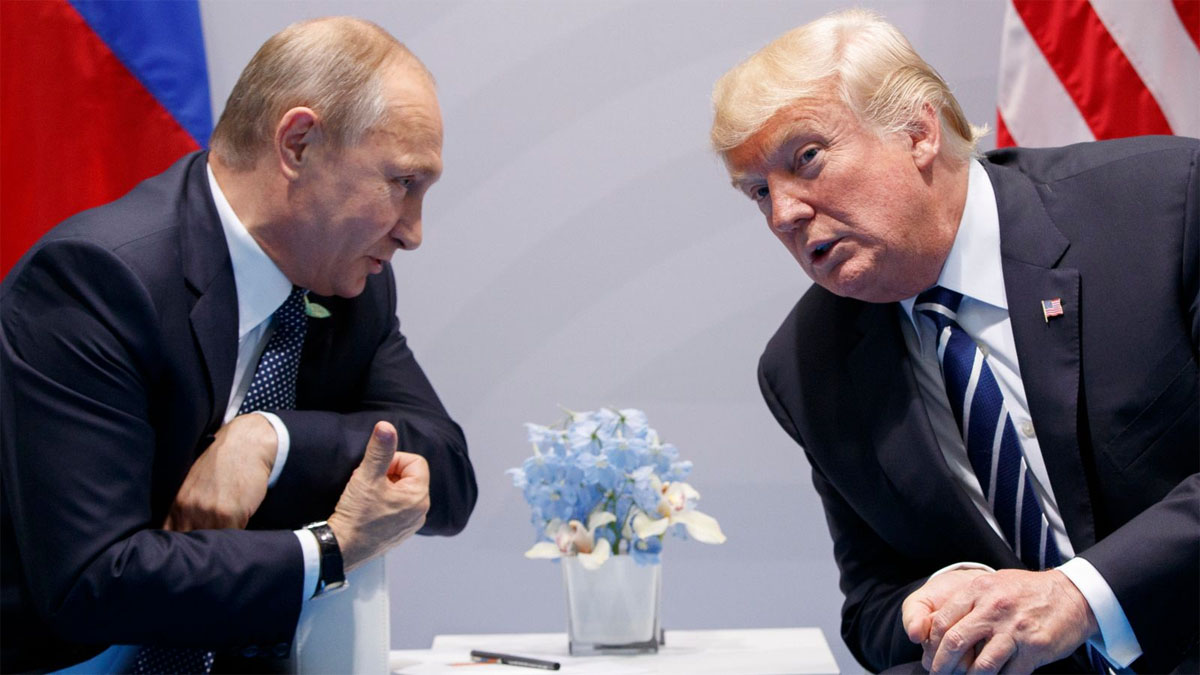
Ceasefire negotiations: Trump ‘very angry’ with Putin
Donald Trump has said he is “very angry” and “pissed off” with Russian President Vladimir Putin after weeks of attempting to negotiate a ceasefire in Ukraine.
In an NBC News interview, the US president criticised Putin for attacking Ukrainian President Volodymyr Zelensky’s credibility, and threatened to impose a 50% tariff on countries buying Russian oil if he did not agree to a ceasefire.
Last week, Putin suggested the possibility of a UN-run government in Ukraine to organise new elections and then begin peace talks.
Trump’s comments mark a change in tone towards Putin. Over the past six weeks, Trump has publicly harangued Zelensky and demanded numerous concessions from Ukraine’s president.
In turn, he has flattered Putin and largely given in to the Russian president’s demands.
European leaders had worried that Trump was cosying up to Putin.
But Trump’s comments on Sunday appeared to be a departure from that dynamic. It is the first time the US has seriously threatened Russia with consequences for dragging its feet in ceasefire negotiations, which would seem to put the diplomatic ball back in Moscow’s court.
NBC News reported that, in a 10-minute phone interview, Trump said he was very angry and “pissed off” when Putin criticised the credibility of Zelensky’s leadership, although the president has himself called Ukraine’s leader a dictator and demanded that he hold elections.
“You could say that I was very angry, pissed off, when… Putin started getting into Zelensky’s credibility, because that’s not going in the right location,” Trump said.
“New leadership means you’re not gonna have a deal for a long time,” he added.
READ ALSO:
When speaking about Putin, Trump said that the Kremlin knew of his anger, but noted that he had “a very good relationship” with the Russian leader and “the anger dissipates quickly… if he does the right thing”.
If Russia does not follow through with a ceasefire, Trump threatened to target its economy further if he thought it was Putin’s fault.
“If Russia and I are unable to make a deal on stopping the bloodshed in Ukraine, and if I think it was Russia’s fault – which it might not be… I am going to put secondary tariffs… on all oil coming out of Russia,” he said.
“There will be a 25% tariff on oil and other products sold in the United States, secondary tariffs,” Trump said, noting that the tariffs on Russia would come in a month without a ceasefire deal.
Secondary tariffs are sanctions on countries that do business with another country. They could constitute up to 50% on goods entering the US from countries still buying oil from Russia. The biggest such buyers by a long margin are China and India.
Zelensky wrote on social media following the interview that “Russia continues looking for excuses to drag this war out even further”.
He said that “Putin is playing the same game he has since 2014”, when Russia unilaterally annexed the Crimean peninsula.
“This is dangerous for everyone – and there should be an appropriate response from the United States, Europe, and all our global partners who seek peace.”
Trump said he would speak to Putin later in the week.
Moscow says the current Ukrainian authorities are illegitimate as President Zelensky has stayed in power beyond the end of his term and is therefore not a valid negotiating partner.
But Zelensky has stayed because elections have been put on hold, legally by martial law and practically by the chaos of war.
It would be almost impossible to hold a valid election with more than five million Ukrainian citizens displaced overseas and many hundreds of thousands away from home fighting on the front line.
READ ALSO:
- Ex-Rivers HoS wife cries for help over husband’s safety
- Fubara reacts as Ex-HOS, Nwaeke accuses him of bombing oil pipelines, Rivers Assembly
- Natasha: Emmanuel Uduaghan threatens to sue Senator Nwaebonyi
Russia launched a full-scale invasion of its neighbour, Ukraine, in February 2022. It currently controls about 20% of Ukrainian territory.
More than 100,000 people fighting for Russia’s military have now died as the war in Ukraine enters the fourth year, according to data analysed by BBC Russian, independent media group Mediazona and volunteers who have been counting deaths since the war began.
Ukraine last updated its casualty figures in December 2024, when President Volodymyr Zelensky acknowledged 43,000 Ukrainian deaths among soldiers and officers. Western analysts believe this figure to be an under-estimate.
Also in the NBC interview on Sunday, Trump said he was “not joking” when he said he would not rule out seeking a third term in the White House, despite it being prohibited by the US Constitution.
“A lot of people want me to do it,” Trump said. “But, I mean, I basically tell them we have a long way to go.”
During the call with NBC, he also again threatened to bomb Iran if it did not agree to a nuclear deal. Trump earlier this month sent a letter to the regime demanding negotiations.
“It will be bombing the likes of which they have never seen before,” he said, noting he would also impose secondary tariffs.
On Sunday, Iran’s president Masoud Pezeshkian said the country would not enter into direct negotiations with Washington concerning their nuclear programme, but indirect talks were possible.
“We don’t avoid talks; it’s the breach of promises that has caused issues for us so far,” he said. “They must prove that they can build trust.”
Ceasefire negotiations: Trump ‘very angry’ with Putin
BBC
-

 Uncategorized3 days ago
Uncategorized3 days agoBreaking: Moon sighted in Saudi, UAE, others, Eid-Fitr holds Sunday
-

 metro2 days ago
metro2 days agoRamadan ends in Nigeria, Sultan announces March 30 as Eid-el-Fitr
-
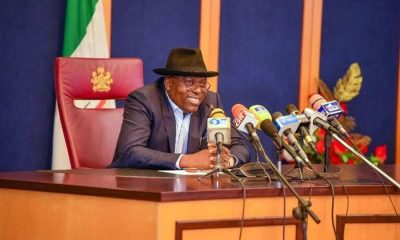
 metro3 days ago
metro3 days agoFubara reacts as Ex-HOS, Nwaeke accuses him of bombing oil pipelines, Rivers Assembly
-

 Opinion3 days ago
Opinion3 days agoBarbaric mass burning of innocents in Edo, by Farooq Kperogi
-
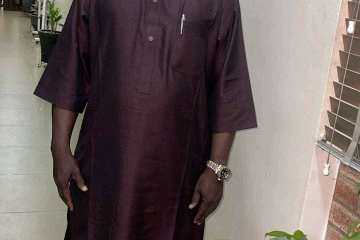
 metro3 days ago
metro3 days agoEmbrace environmental sanitation during Eid-Fitr, LAGESC boss tells Lagosians
-

 metro3 days ago
metro3 days agoEx-Rivers HoS wife cries for help over husband’s safety
-
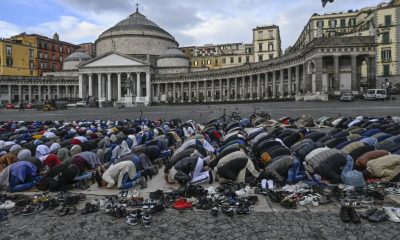
 International1 day ago
International1 day agoIn pictures: Eid celebrations around the world
-
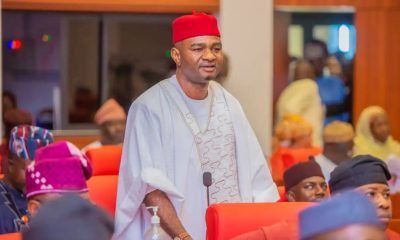
 metro3 days ago
metro3 days agoNatasha: Emmanuel Uduaghan threatens to sue Senator Nwaebonyi



